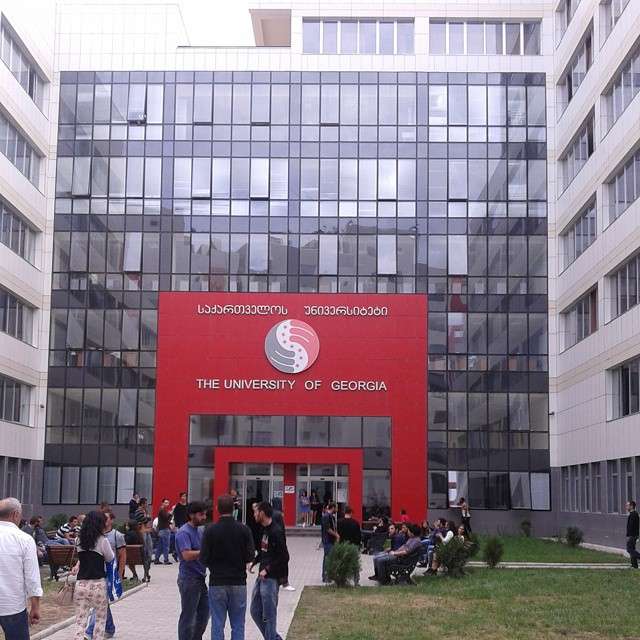

"Discover why Srishty Khera & Team Study Abroad Campus is the trusted choice for MBBS Abroad - watch our student and parent testimonials today!"

University of Georgia Overview
Nestled in the heart of Athens, the University of Georgia (UGA) stands as a beacon of academic excellence, innovation, and cultural heritage. As one of the oldest and most prestigious public universities in the United States, UGA has a rich history of scholarship, research, and community engagement. Let’s embark on a journey to explore the unique attributes and offerings that define the University of Georgia.
Historic Legacy: Founded in 1785, the University of Georgia holds the distinction of being the first state-chartered public university in the United States. With a legacy spanning over two centuries, UGA has played a pivotal role in shaping the educational landscape of the nation and continues to uphold its commitment to providing accessible and quality education to students from diverse backgrounds.
Academic Excellence: UGA offers a comprehensive range of undergraduate, graduate, and professional programs across various disciplines, including liberal arts, sciences, business, engineering, agriculture, and more. With world-class faculty members, cutting-edge research facilities, and innovative teaching methodologies, UGA provides students with an exceptional learning environment that fosters intellectual curiosity, critical thinking, and lifelong learning.
Research Innovation: As a leading research institution, the University of Georgia is at the forefront of scientific discovery, technological innovation, and interdisciplinary collaboration. UGA’s research endeavors span a wide range of fields, from agriculture and environmental sciences to biomedicine, cybersecurity, and beyond. Through groundbreaking research projects, partnerships with industry and government agencies, and involvement in global initiatives, UGA contributes to the advancement of knowledge and addresses complex challenges facing society.
Student-Centered Community: UGA prides itself on its vibrant and inclusive campus community, where students are empowered to pursue their passions, engage in extracurricular activities, and make meaningful contributions to society. With over 800 student organizations, cultural events, volunteer opportunities, and leadership programs, UGA offers a rich array of experiences that complement academic studies and enrich the overall student experience.
Athens, Georgia: Situated in the picturesque city of Athens, UGA benefits from a vibrant cultural scene, thriving arts community, and lively downtown area. Known for its historic architecture, music venues, art galleries, and eclectic dining options, Athens provides students with a dynamic and engaging backdrop for their academic pursuits and personal growth. From exploring local landmarks to attending concerts, festivals, and sporting events, students at UGA have access to a wealth of cultural and recreational opportunities.
Conclusion: In conclusion, the University of Georgia epitomizes a commitment to academic excellence, research innovation, and student success. With its historic legacy, diverse academic offerings, research prowess, and vibrant campus community, UGA continues to uphold its reputation as a premier institution of higher learning. As students embark on their journey at the University of Georgia, they join a community dedicated to fostering intellectual curiosity, creativity, and social responsibility, preparing them to lead and thrive in an ever-changing world.
University of Georgia Fee Structure 2024-25


University of Georgia Course Duration
The University of Georgia (UGA), nestled in the historic city of Athens, stands as a beacon of academic excellence and innovation, offering a diverse array of undergraduate and graduate programs across various disciplines. As prospective students embark on their educational journey, understanding the course duration at UGA is essential for planning their academic pathways and achieving their academic goals. Let’s explore the unique aspects of course duration at the University of Georgia.
Undergraduate Programs: UGA’s undergraduate programs typically follow a traditional academic structure, with most bachelor’s degree programs spanning four years of full-time study. However, the duration of undergraduate programs may vary depending on factors such as the chosen major, credit requirements, and individual student progress. Some programs, particularly those in engineering, business, or agricultural sciences, may require additional semesters or co-op experiences to fulfill degree requirements.
Graduate Programs: UGA offers a wide range of graduate and professional programs, including master’s degrees, doctoral degrees, and professional degrees in fields such as business, law, education, public health, and more. The duration of graduate programs varies depending on the level of study and the specific requirements of each program. Master’s programs typically range from one to two years, while doctoral programs may take three to six years to complete, depending on the research and dissertation requirements.
Accelerated and Dual Degree Programs: UGA offers several accelerated and dual degree programs designed to provide students with opportunities to complete their studies more efficiently or pursue multiple degrees simultaneously. These programs allow students to earn bachelor’s and master’s degrees in a shortened timeframe or combine different areas of study to enhance their academic and career prospects. Accelerated programs may require students to take on a heavier course load or participate in summer sessions to expedite their degree completion.
Online and Distance Learning Options: In addition to traditional on-campus programs, UGA offers a variety of online and distance learning options for students seeking flexibility and convenience in their academic pursuits. Online courses and degree programs allow students to complete coursework remotely, accessing lectures, assignments, and discussions through virtual platforms. The duration of online programs may vary depending on the program structure and individual student pace.
Certificate Programs and Continuing Education: UGA’s Office of Continuing Education offers a range of certificate programs and professional development courses designed to enhance skills, expand knowledge, and advance careers. These programs are often tailored to meet the needs of working professionals or individuals seeking specialized training in specific fields. Certificate programs may vary in duration, ranging from a few weeks to several months, depending on the program requirements and intensity of study.
Conclusion: In conclusion, the course duration at the University of Georgia is as diverse and varied as the academic programs it offers. Whether pursuing an undergraduate degree, a graduate degree, or professional development opportunities, students at UGA have access to a wealth of academic pathways designed to accommodate their individual interests, goals, and schedules. By understanding the nuances of course duration at UGA, prospective students can make informed decisions about their educational journey and embark on a path to academic success and personal fulfillment.
Eligibility Criteria by University of Georgia
The University of Georgia (UGA), nestled in the historic city of Athens, serves as a gateway to academic excellence and personal growth for students from diverse backgrounds. Aspiring scholars seeking admission to UGA must navigate through a set of eligibility criteria designed to identify individuals with the drive, determination, and potential to thrive in a dynamic learning environment. Let’s unravel the unique aspects of eligibility criteria set forth by the University of Georgia, paving the way for prospective students to unlock their academic potential.
Academic Excellence: At the heart of UGA’s eligibility criteria lies a commitment to academic excellence and intellectual curiosity. Prospective undergraduate students are typically evaluated based on their high school academic performance, including grade point average (GPA), course rigor, and standardized test scores such as the SAT or ACT. While there is no specific cutoff for GPA or test scores, successful applicants demonstrate a strong academic foundation and a passion for learning.
Demonstrated Leadership and Extracurricular Involvement: UGA values students who exhibit leadership potential, initiative, and a commitment to extracurricular involvement. Alongside academic achievements, applicants are encouraged to highlight their involvement in extracurricular activities such as student government, community service, sports, clubs, or cultural organizations. Demonstrated leadership roles, accomplishments, and contributions to the community showcase applicants’ holistic abilities and potential to make a positive impact on campus.
Personal Statement or Essay: As part of the application process, UGA often requires prospective students to submit a personal statement or essay that provides insight into their character, aspirations, and reasons for choosing UGA. This component allows applicants to showcase their unique qualities, experiences, and perspectives, highlighting what they can contribute to the university community and how they envision their academic and personal growth at UGA.
Letters of Recommendation: Letters of recommendation play a significant role in UGA’s evaluation of prospective students, providing insights into applicants’ character, work ethic, and potential for success. Applicants are typically required to submit letters from teachers, counselors, or mentors who can speak to their academic abilities, personal qualities, and readiness for college-level study. Strong letters of recommendation affirm applicants’ qualifications and enhance their candidacy for admission to UGA.
Demonstrated Interest and Fit: UGA seeks applicants who demonstrate a genuine interest in the university and a strong alignment with its values, mission, and campus culture. Prospective students are encouraged to engage with UGA through campus visits, information sessions, virtual tours, and interactions with admissions representatives. Demonstrating interest in UGA and understanding how the university aligns with their academic and personal goals can strengthen applicants’ chances of admission.
Conclusion: In conclusion, the eligibility criteria set forth by the University of Georgia reflect a holistic approach to admissions, valuing academic achievement, leadership potential, extracurricular involvement, personal qualities, and fit with the university community. By understanding and meeting these criteria, prospective students can position themselves as strong candidates for admission to UGA and embark on a transformative educational journey characterized by academic excellence, personal growth, and lifelong learning.
Facilities & Infrastructure at University of Georgia
Nestled in the charming city of Athens, the University of Georgia (UGA) boasts not only a rich academic tradition but also state-of-the-art facilities and infrastructure that enhance the educational experience for students, faculty, and staff. From cutting-edge research laboratories to world-class athletic facilities, UGA’s commitment to providing top-tier amenities reflects its dedication to fostering excellence in teaching, learning, and research. Let’s explore the unique facilities and infrastructure that set the University of Georgia apart and contribute to its vibrant campus community.
Modern Academic Buildings: UGA’s campus features modern academic buildings equipped with the latest technology and resources to support teaching, research, and collaborative learning. From lecture halls and seminar rooms to specialized laboratories and studios, these facilities provide students with an optimal environment for academic exploration and discovery. With comfortable seating, multimedia capabilities, and interactive learning tools, UGA’s academic buildings facilitate dynamic and engaging classroom experiences that inspire creativity and intellectual inquiry.
Cutting-Edge Research Facilities: As a leading research institution, UGA offers a wealth of cutting-edge research facilities and resources across various disciplines. From biomedical research laboratories and agricultural testing facilities to engineering innovation centers and environmental monitoring stations, UGA provides researchers with the tools and infrastructure needed to push the boundaries of knowledge and make groundbreaking discoveries. These facilities foster interdisciplinary collaboration, innovation, and scientific advancement, positioning UGA at the forefront of research excellence.
Libraries and Information Resources: UGA’s libraries serve as vibrant hubs of scholarship, offering extensive collections, digital resources, and specialized services to support teaching, learning, and research. The UGA Libraries system comprises several libraries and archives, including the Main Library, the Science Library, the Special Collections Library, and more. With comfortable study spaces, computer labs, and access to a vast array of online databases and research materials, UGA’s libraries empower students and faculty to explore diverse topics, conduct research, and engage in intellectual inquiry.
Athletic Facilities and Recreation Centers: UGA’s commitment to holistic student development extends beyond the classroom to its world-class athletic facilities and recreation centers. From the iconic Sanford Stadium, home to UGA’s beloved football team, to the Ramsey Student Center for Physical Activities, UGA offers a variety of facilities for sports, fitness, and recreational activities. Students have access to state-of-the-art gymnasiums, swimming pools, indoor and outdoor courts, fitness classes, and wellness programs, promoting a healthy and active lifestyle for the entire campus community.
Cultural and Performance Venues: UGA’s campus is home to a vibrant arts and culture scene, with numerous venues dedicated to showcasing performances, exhibitions, and creative expression. From the Performing Arts Center and the Georgia Museum of Art to the Hugh Hodgson School of Music and the Lamar Dodd School of Art, UGA provides students, faculty, and the community with opportunities to engage with diverse forms of artistic expression and cultural enrichment. These venues serve as focal points for creativity, collaboration, and community engagement, fostering a vibrant cultural ecosystem at UGA.
Conclusion: In conclusion, the University of Georgia’s facilities and infrastructure reflect its commitment to providing students with a dynamic and enriching educational experience. With modern academic buildings, cutting-edge research facilities, state-of-the-art libraries, world-class athletic venues, and vibrant cultural spaces, UGA offers a supportive environment where students can thrive academically, socially, and personally. By investing in top-tier amenities and resources, UGA empowers students, faculty, and staff to pursue their passions, achieve their goals, and make a positive impact on the world.
Documents Required for Admission at University of Georgia
The University of Georgia (UGA), nestled in the historic city of Athens, opens its doors to aspiring scholars from around the world, offering a pathway to academic excellence, personal growth, and professional success. For prospective students seeking admission to UGA, understanding the essential documents required for the application process is key to unlocking opportunities and realizing their educational aspirations. Let’s explore the unique set of documents needed for admission at the University of Georgia, paving the way for prospective students to embark on their academic journey with confidence.
High School Transcripts: One of the primary documents required for admission to UGA is the submission of official high school transcripts. These transcripts provide a comprehensive record of an applicant’s academic performance throughout their high school years, including grades, courses taken, and cumulative grade point average (GPA). High school transcripts offer admissions committees valuable insights into applicants’ academic readiness and preparedness for college-level study at UGA.
Standardized Test Scores: Prospective undergraduate students applying to UGA typically need to submit official scores from standardized tests such as the SAT or ACT. These tests assess students’ proficiency in critical reading, writing, and mathematical reasoning, providing a standardized measure of academic aptitude. While UGA does not have specific cutoff scores for admission, strong performance on standardized tests can enhance applicants’ competitiveness and strengthen their candidacy for admission.
Letters of Recommendation: Letters of recommendation play a crucial role in UGA’s evaluation of prospective students, providing insights into applicants’ character, abilities, and potential for success. Applicants are typically required to submit letters from teachers, counselors, or mentors who can speak to their academic achievements, personal qualities, and readiness for college-level study at UGA. Strong letters of recommendation offer compelling endorsements of applicants’ qualifications and suitability for admission.
Personal Statement or Essay: UGA often requires prospective students to submit a personal statement or essay as part of the application process. This component allows applicants to share their personal experiences, aspirations, and reasons for choosing UGA, providing admissions committees with a glimpse into their character, motivations, and fit with the university community. A well-crafted personal statement or essay can showcase applicants’ unique qualities, perspectives, and potential contributions to UGA.
Additional Materials: Depending on the specific program or degree sought, applicants to UGA may be required to submit additional materials such as portfolios, resumes, or writing samples. These supplemental materials allow applicants to showcase their talents, achievements, and relevant experiences in their chosen field of study. By providing a comprehensive overview of their qualifications, applicants can strengthen their candidacy for admission to UGA and demonstrate their readiness for academic success.
Conclusion: In conclusion, the University of Georgia’s admission process requires prospective students to submit a range of essential documents that provide a comprehensive overview of their academic achievements, personal qualities, and readiness for college-level study. By understanding and meeting the document requirements set forth by UGA, prospective students can position themselves as strong candidates for admission and embark on a transformative educational journey characterized by academic excellence, personal growth, and lifelong learning.
University of Georgia Ranking 2024-25
The University of Georgia (UGA), nestled in the vibrant city of Athens, continues to ascend in the realm of higher education, earning accolades and recognition for its commitment to academic excellence, research innovation, and student success. As the landscape of higher education evolves, UGA’s dedication to fostering a dynamic learning environment and pushing the boundaries of knowledge propels it to new heights in the global rankings for the 2024-25 academic year. Let’s delve into the unique factors contributing to the University of Georgia’s rising prominence in the rankings.
Academic Excellence: At the core of UGA’s success is its unwavering commitment to academic excellence and innovation. With a diverse array of undergraduate, graduate, and professional programs across various disciplines, UGA provides students with a transformative educational experience characterized by rigorous coursework, engaged faculty, and hands-on learning opportunities. UGA’s dedication to academic quality and student-centered teaching earns it high marks in national and international rankings, reaffirming its position as a top-tier institution of higher learning.
Research Impact: As a leading research institution, UGA excels in pushing the boundaries of knowledge and addressing complex challenges facing society. From biomedical breakthroughs and agricultural advancements to environmental sustainability and social sciences research, UGA’s faculty and researchers are at the forefront of innovation and discovery. With state-of-the-art research facilities, interdisciplinary collaborations, and robust funding support, UGA’s research endeavors contribute to its growing reputation as a hub of research excellence.
Student Success and Engagement: UGA’s commitment to student success extends beyond the classroom to its vibrant campus community, where students are empowered to thrive academically, socially, and personally. From academic advising and career counseling to leadership development and extracurricular activities, UGA provides students with a supportive ecosystem that nurtures their talents, aspirations, and ambitions. High graduation rates, strong alumni networks, and positive student outcomes contribute to UGA’s reputation for fostering student success and engagement.
Community Impact: Beyond its campus borders, UGA serves as a catalyst for positive change and community engagement, making meaningful contributions to the local and global community. Through service-learning initiatives, community partnerships, and outreach programs, UGA leverages its resources and expertise to address pressing social, economic, and environmental challenges. UGA’s commitment to social responsibility and public service enhances its standing in the rankings, reflecting its broader impact and relevance in society.
Conclusion: In conclusion, the University of Georgia’s rising prominence in the rankings for the 2024-25 academic year underscores its commitment to excellence, innovation, and impact. With a dedication to academic quality, research excellence, student success, and community engagement, UGA continues to distinguish itself as a leading institution of higher learning on the national and international stage. As UGA builds on its strengths and embraces new opportunities, it is poised to further elevate its standing in the rankings, solidifying its position as a premier destination for students, faculty, and researchers seeking to make a difference in the world.
Hostel Facility at University of Georgia
Nestled in the historic city of Athens, the University of Georgia (UGA) not only offers top-tier academic programs but also provides a vibrant and supportive living environment through its hostel facilities. For students seeking convenience, camaraderie, and immersion in campus life, UGA’s hostel accommodations offer a unique opportunity to enhance their collegiate experience. Let’s explore the distinctive features and benefits of the hostel facility at the University of Georgia.
Convenient Location: UGA’s hostel facilities are strategically located on or near campus, offering students easy access to academic buildings, dining halls, recreational facilities, and campus resources. With convenient transportation options and proximity to campus amenities, UGA’s hostels provide students with a central hub from which to navigate their academic and social endeavors.
Modern Amenities: UGA’s hostel accommodations boast modern amenities designed to enhance students’ comfort and convenience. From spacious living areas and study lounges to high-speed internet access and laundry facilities, UGA’s hostels provide students with everything they need to thrive in their academic and personal pursuits. Comfortable furnishings, climate control, and 24/7 security ensure a safe and welcoming environment for residents.
Diverse Housing Options: UGA offers a variety of housing options within its hostel facilities to accommodate the diverse needs and preferences of students. Whether students prefer single or shared rooms, traditional or apartment-style living, UGA’s hostels provide flexible housing arrangements to suit individual lifestyles and budgets. Students can choose from a range of floor plans and configurations to create a living space that feels like home.
Community and Engagement: One of the most significant benefits of living in UGA’s hostels is the sense of community and camaraderie fostered among residents. From organized social events and community activities to shared common spaces and recreational facilities, UGA’s hostels provide students with opportunities to connect, collaborate, and form lifelong friendships. Living in close proximity to peers enhances the collegiate experience and creates a supportive network of peers.
Resident Support and Services: UGA’s hostel facilities offer comprehensive resident support and services to ensure students’ well-being and success. Resident advisors, housing staff, and campus resources are readily available to assist students with any questions, concerns, or needs they may have during their stay. From academic support to personal counseling, UGA’s hostels provide a holistic support system that prioritizes students’ overall health and happiness.
Conclusion: In conclusion, the hostel facility at the University of Georgia offers students a convenient, comfortable, and engaging living experience that complements their academic journey. With modern amenities, diverse housing options, vibrant community life, and dedicated support services, UGA’s hostels provide students with a home away from home where they can thrive academically, socially, and personally. By choosing to reside in UGA’s hostels, students can immerse themselves in the rich tapestry of campus life and create lasting memories that will enrich their collegiate experience for years to come.
Admission Process for University of Georgia
The University of Georgia (UGA), nestled in the historic city of Athens, welcomes aspiring scholars from around the world to embark on a transformative educational journey. The admission process at UGA is carefully designed to identify talented individuals who possess the drive, dedication, and potential to excel in their academic pursuits. Let’s explore the unique and comprehensive admission process for the University of Georgia, guiding prospective students on their path to success.
- Research and Exploration: The first step in the admission process for UGA begins with research and exploration. Prospective students are encouraged to explore UGA’s academic programs, faculty expertise, campus facilities, and student life offerings to determine if UGA is the right fit for their educational and personal goals. The university’s website, informational sessions, campus tours, and virtual resources provide valuable insights into the UGA experience.
- Application Submission: Once prospective students have identified UGA as their desired academic destination, they must complete and submit an online application through the UGA Admissions portal. The application typically requires personal information, academic history, standardized test scores (SAT or ACT), high school transcripts, and a personal statement or essay. Applicants should carefully review and adhere to application deadlines to ensure timely submission.
- Holistic Review Process: UGA employs a holistic review process to evaluate applicants’ qualifications, achievements, and potential for academic success. Admissions committees consider various factors, including academic performance, standardized test scores, extracurricular activities, leadership experiences, community involvement, and personal characteristics. Each application is reviewed comprehensively, taking into account the applicant’s unique background and circumstances.
- Supplemental Materials: In addition to the standard application components, some UGA programs may require supplemental materials such as letters of recommendation, portfolios, auditions, or writing samples. These materials provide applicants with opportunities to showcase their talents, achievements, and interests in their chosen field of study. Applicants should carefully review program-specific requirements and submit all requested materials by the specified deadlines.
- Admission Decision: After thorough review and consideration, UGA’s admissions committees render admission decisions based on the applicant’s qualifications and fit with the university’s academic community. Admitted students receive notification of their admission status through the UGA Admissions portal or via email. Admitted students may also receive information about financial aid, scholarships, housing, and orientation programs to facilitate their transition to UGA.
- Enrollment and Orientation: Upon acceptance to UGA, newly admitted students are invited to enroll in classes and participate in orientation programs designed to facilitate their transition to campus life. Orientation sessions provide students with information about academic requirements, campus resources, student support services, and extracurricular opportunities. During enrollment, students select their courses, meet with academic advisors, and prepare for the upcoming semester.
Conclusion: In conclusion, the admission process for the University of Georgia is a comprehensive and holistic journey that empowers prospective students to showcase their strengths, talents, and potential for academic success. By navigating the steps outlined in the admission process, prospective students can embark on their educational journey at UGA with confidence and clarity, knowing that they are well-equipped to thrive in a supportive and enriching academic environment. As students prepare to immerse themselves in the vibrant community of UGA, they are poised to embrace the opportunities and challenges that await on the path to academic and personal fulfillment.
University of Georgia Photos



University of Georgia MBBS Syllabus
The University of Georgia (UGA) stands as a beacon of academic excellence, not only in traditional disciplines but also in the realm of medical education. Aspiring medical professionals who choose to embark on their MBBS journey at UGA are met with a rigorous curriculum designed to equip them with the knowledge, skills, and clinical expertise necessary to excel in the field of medicine. Let’s delve into the unique and comprehensive MBBS syllabus at the University of Georgia, highlighting the foundational principles and specialized areas of study that shape future physicians.
Foundational Sciences: The MBBS syllabus at UGA begins with a strong emphasis on foundational sciences, laying the groundwork for understanding the human body’s structure and function. Courses in anatomy, physiology, biochemistry, and histology provide students with a deep understanding of the fundamental principles underlying health and disease. Through lectures, laboratory sessions, and hands-on dissection experiences, students gain a comprehensive understanding of the human body’s intricate systems and how they interact to maintain homeostasis.
Preclinical Studies: Building upon the foundational sciences, preclinical studies in the MBBS curriculum at UGA focus on integrating knowledge from multiple disciplines to understand the pathophysiology of diseases and their clinical manifestations. Courses in pathology, pharmacology, microbiology, and immunology explore the mechanisms of disease, principles of pharmacotherapy, and the body’s immune response to pathogens. Through case-based learning, simulations, and interactive sessions, students develop critical thinking skills and diagnostic reasoning abilities essential for clinical practice.
Clinical Rotations: The latter years of the MBBS program at UGA transition students from the classroom to the hospital setting, where they engage in clinical rotations across various medical specialties. Clinical rotations provide students with hands-on experience working alongside healthcare professionals, diagnosing and treating patients, and participating in real-world medical scenarios. Rotations in internal medicine, surgery, pediatrics, obstetrics and gynecology, psychiatry, and other specialties expose students to a diverse range of patient populations and medical conditions, preparing them for the challenges and responsibilities of medical practice.
Elective and Specialized Courses: In addition to core curriculum requirements, UGA’s MBBS program offers elective and specialized courses that allow students to explore their interests and pursue additional areas of study. Elective rotations in subspecialties such as cardiology, oncology, neurology, and emergency medicine provide students with opportunities to deepen their knowledge and skills in specific areas of interest. Additionally, research opportunities, global health experiences, and community service projects enrich students’ educational experiences and foster a spirit of inquiry and innovation.
Conclusion: In conclusion, the MBBS syllabus at the University of Georgia reflects a commitment to excellence in medical education, blending rigorous academic coursework with hands-on clinical experiences to prepare future physicians for the challenges and opportunities of modern healthcare practice. Through a comprehensive curriculum that integrates foundational sciences, preclinical studies, clinical rotations, and specialized courses, UGA equips students with the knowledge, skills, and empathy needed to provide compassionate and competent care to diverse patient populations. As students progress through the MBBS program at UGA, they are empowered to embrace the responsibilities and rewards of a career dedicated to healing, innovation, and service to humanity.
Important FAQs
Ans: UGA offers a diverse array of undergraduate, graduate, and professional programs across various disciplines, including liberal arts, sciences, business, engineering, agriculture, education, and more. From traditional majors to specialized fields of study, UGA provides students with a comprehensive range of academic pathways to pursue their passions and achieve their educational goals.
Ans: UGA is committed to making education accessible and affordable for all students and offers a range of financial aid options, including scholarships, grants, loans, and work-study programs. Prospective students can explore financial aid opportunities through the UGA Office of Financial Aid and Scholarships and should complete the Free Application for Federal Student Aid (FAFSA) to determine eligibility for need-based aid.
Ans: UGA is a leading research institution with a strong emphasis on innovation, discovery, and interdisciplinary collaboration. Students have access to a wide range of research opportunities across various disciplines, working alongside world-class faculty members on cutting-edge projects that address real-world challenges and contribute to the advancement of knowledge.
Ans: UGA offers comprehensive support services to help students succeed academically, personally, and professionally. From academic advising and tutoring services to counseling and wellness programs, UGA provides students with the resources and support they need to thrive in all aspects of their college experience.
Ans: The admission process at UGA is comprehensive and holistic, taking into account various factors such as academic performance, standardized test scores, extracurricular activities, personal statements, and letters of recommendation. Prospective students can apply online through the UGA Admissions portal and should carefully review application deadlines and requirements for their desired program.

